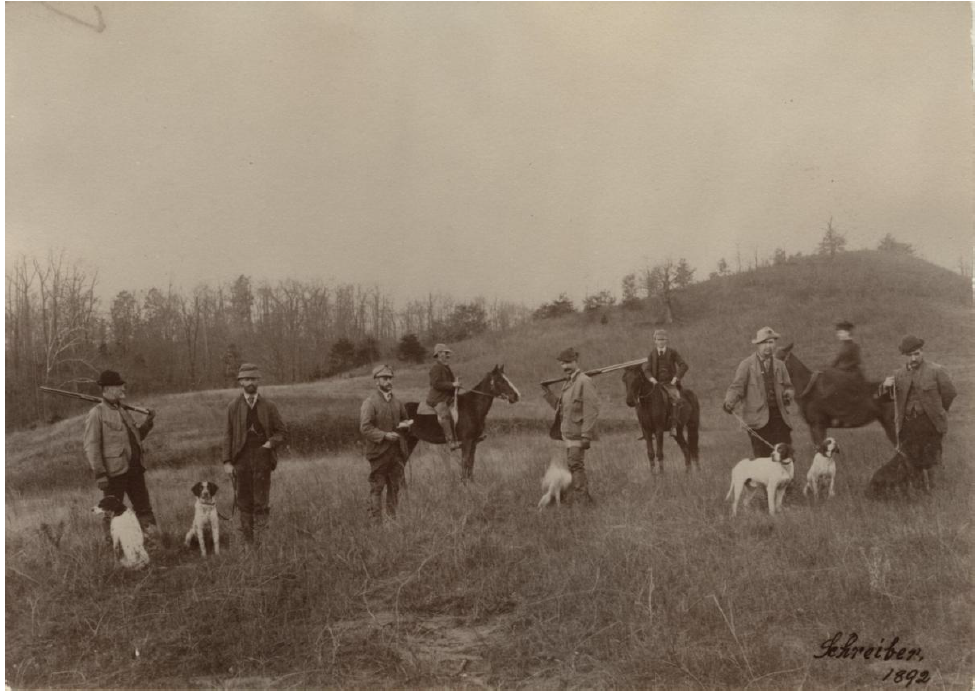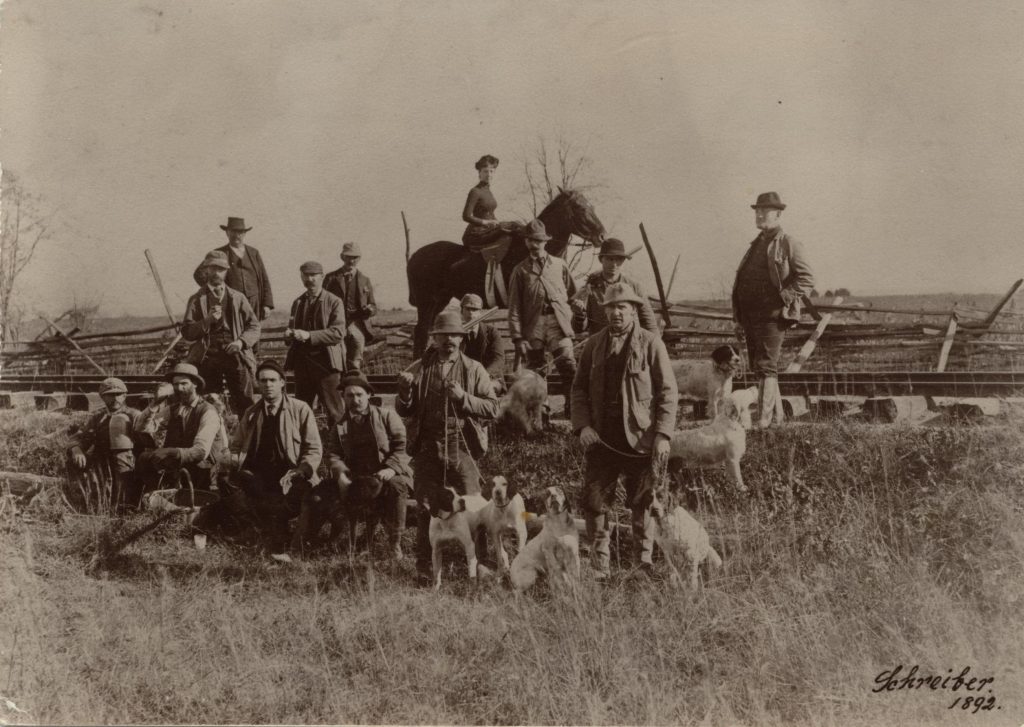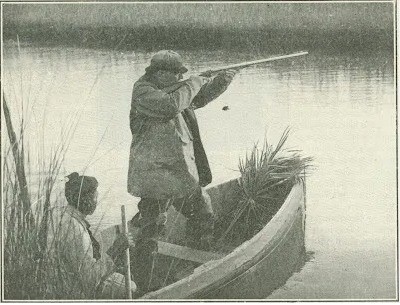Duck Hunting on the Potomac
Some came by boat and others by train. From the 1870s until the Great Depression, Stafford’s Potomac River and Aquia Creek shorelines were destinations for wealthy men in search of good hunting venues. Historically, the creeks and rivers had always provided food for those who lived near them. The waters teemed with fish, crabs, and oysters. Also in prolific supply was a grand assortment of water fowl. After the Civil War, Stafford’s wildlife rebounded far better than did her human residents. The area’s abundant wildlife enabled post-war residents to feed their families and provided them with much needed business opportunities.
Just up the Potomac River from war-torn Stafford was Washington, DC. Like today, the city teemed with wealthy professionals and politicians. Beyond that, New York and Philadelphia were home to well-to-do men, many of whom enjoyed the sporting life. The R F & P Railroad provided a direct connection between Stafford County and scores of wealthy northerners for whom good hunting was a passion.
Here was an exciting business opportunity for locals who had few other economic options. Amongst the rich and famous, recognition of Stafford County as a happy hunting ground occurred shortly after the close of the war. While some county residents chose to sell their land to consortiums of hunters, others acted as guides or opened their houses to provide lodging, food, and entertainment to hunters—for payment, of course. The duck hunting craze provided an economic boost to local residents when they desperately needed it. There seem to have been any number of local families who ran their own private hunting businesses.
At some point during the 1870s, a group called the Washington Ducking Club organized themselves and leased the 300-acre Coal Trips tract. This may have been the first group to organize a hunt club here, but little is known about them. By 1885, the club had folded and the property was sold to settle an unrelated law suit.
In 1878, a group of Washington hunters purchased Chappawamsic Island, which is located a short distance out in the Potomac River from its junction with Chappawamsic Creek. Known as the Mt. Vernon Ducking Association, this very exclusive club included as a member Theodore Roosevelt. The group built a comfortable clubhouse on the island and held title to it until 1894 when they conveyed it to another small group of wealthy hunters. Some of Dr. Samuel P. Langley’s helpers lodged in the clubhouse in 1903, apparently uninvited, during the time he was doing his “airship experiments” nearby in the Potomac River. The hunt club members didn’t appreciate the outsiders and asked Langley’s men to leave.
Framed by the Potomac River and Aquia Creek, the Widewater peninsula was another ideal location for duck hunting. Confederate General Fitzhugh Lee inherited part of the peninsula that had frontage on both waterways. In 1883, he leased this to the trustees of the West End Ducking Club of Washington, DC. In return for an annual rent of $125, the club had the right to hunt and shoot on the property as well as on the waters of Aquia Creek and the Potomac. They also had permission to build a clubhouse there.
In October of 1883, New Yorker Thomas Paton executed a four-year agreement for “exclusive hunting, fowling and water privileges attached to and belonging to the farm known as Loughlin Farm on Aquia Creek.” Part of this property included the area called Aquia Landing. Paton was married to Philadelphia bank heiress Marion Rawle. In 1887, he purchased Simms’ or Brent’s Point from Gen. Fitzhugh Lee. To his exclusive hunting establishment, he added what he called the New York Yacht Club. Paton may have been involved with the previously mentioned West End Ducking Club. The local newspaper reported that he “is now fitting up the house and grounds which he will use as a gunning and fishing resort for himself and friends.” Paton seem to have used an already standing, older house and added to this substantially so that large numbers of friends and guests might be comfortably accommodated. This expansive dwelling remains on Brent’s Point overlooking Aquia Creek and the Potomac River.
In the mid-1880s, the R F & P Railroad leased part of their Aquia Landing property to a group of seven wealthy men who called themselves the Quantico Ducking Club. At least some of these men were from Richmond, Virginia. They built a clubhouse and boathouse on the tract and used the property until around 1888 when they purchased Coal Trips and reorganized themselves as the Game Point Association. This club functioned until at least 1897 when they sold the Coal Trips property to William Rauch, Sr. of Manhattan. Rauch’s wife was related to the previously mentioned Thomas Paton. Part of this property is now occupied by a Girl Scout facility called “Camp Cole’s Trip.”
The Fredericksburg Ducking Club used a small tract of land on the south side of Aquia Creek. This included the old Gourds Fishing Shore and was located not far from Coal Trips. Other local ducking establishments included the Richmond Ducking Club (used land on the lower end of the Widewater peninsula), the Aquia Creek Outing Club (officers were from Washington, DC), the Pocahontas Club (leased property on the south side of Aquia Creek near the railroad bridge), and the Clifton Ducking Club run by Withers Waller. This latter effort operated from at least 1883 to 1928. In 1889, President Harrison took a break from running the country to do a bit of duck hunting in Widewater. In 1896, Grover Cleveland also hunted ducks at Clifton.
In 1926, a group of wealthy New Yorkers incorporated themselves and acquired by purchase and lease, part of the Widewater peninsula, giving them access to Aquia Creek and the Potomac River. They called themselves the Blue Wing Hunt Club. President was Dr. George Bolling Lee, a grandson of Gen. Robert E. Lee, and a resident of the Plaza Hotel in New York. Secretary was R. M. Littlejohn, who was Dr. Lee’s first cousin. This seems to have been one of the last of these clubs to enjoy hunting opportunities in Stafford as the Great Depression brought an end to most of those types of activities.




